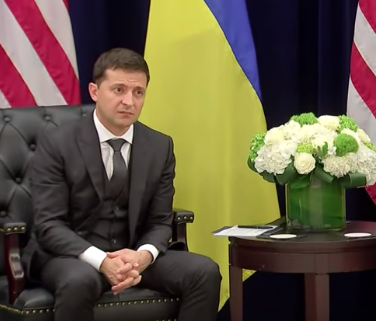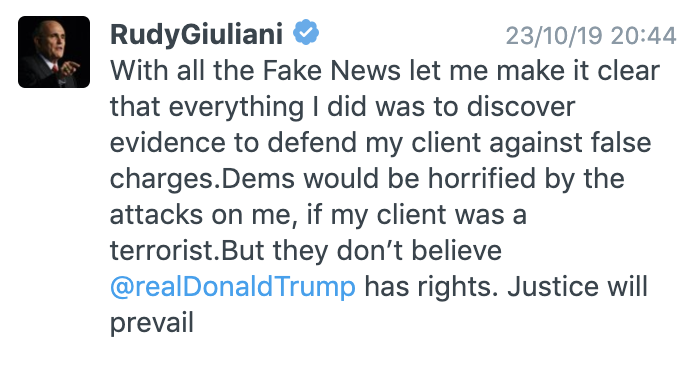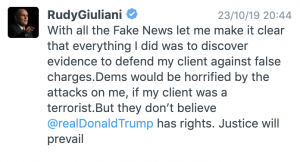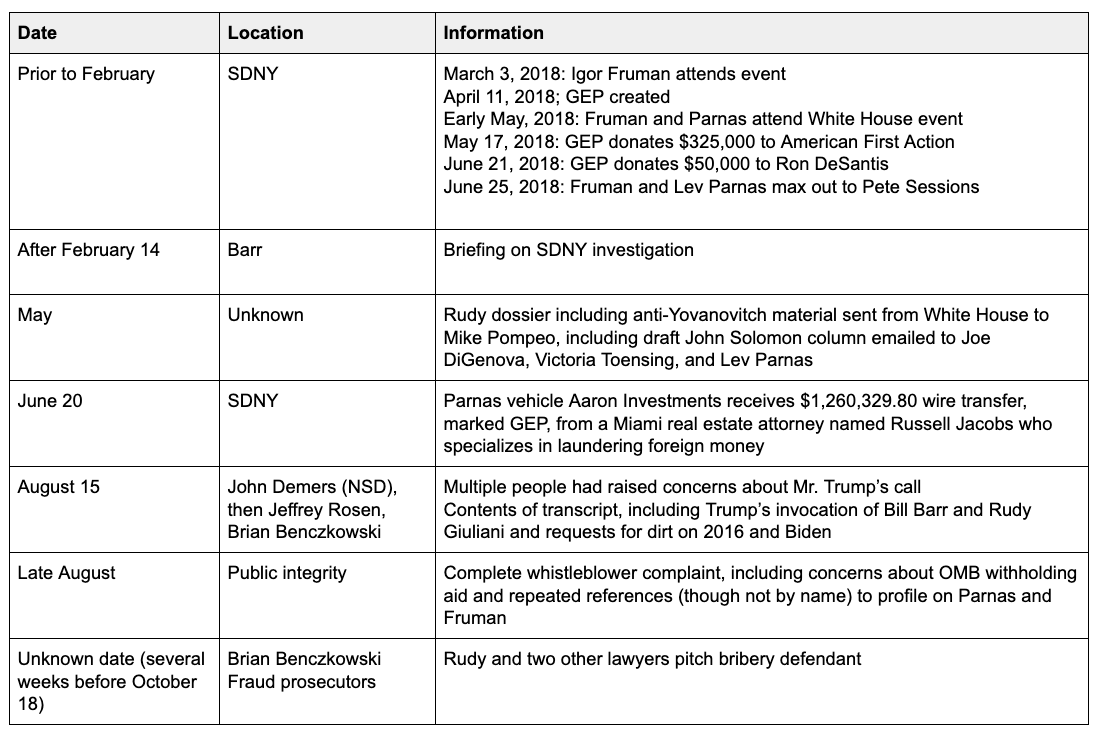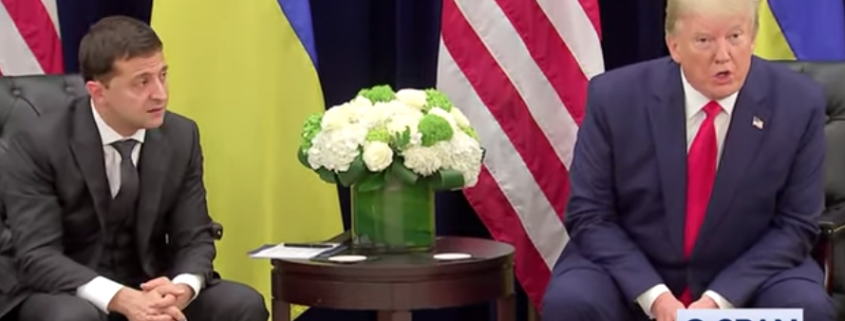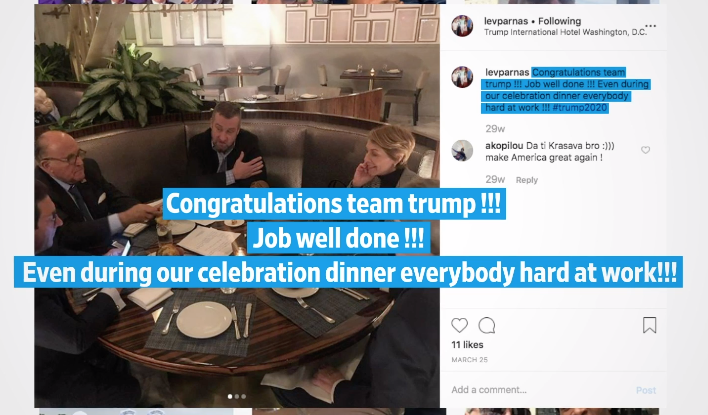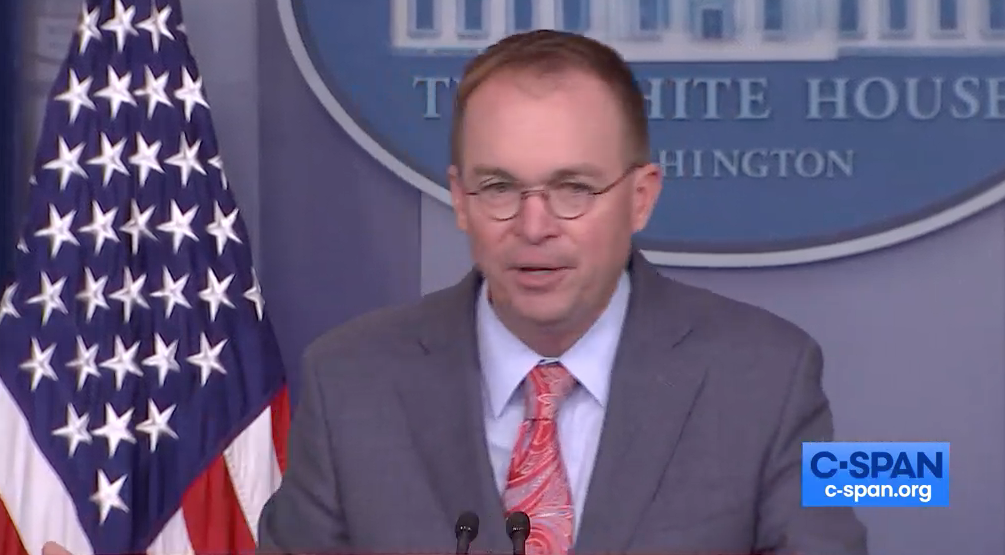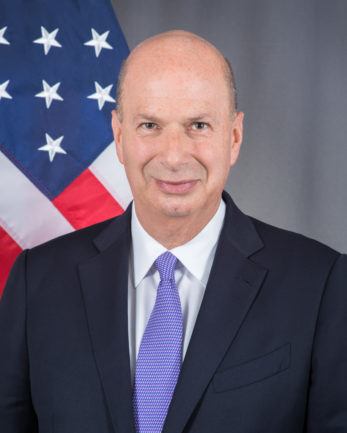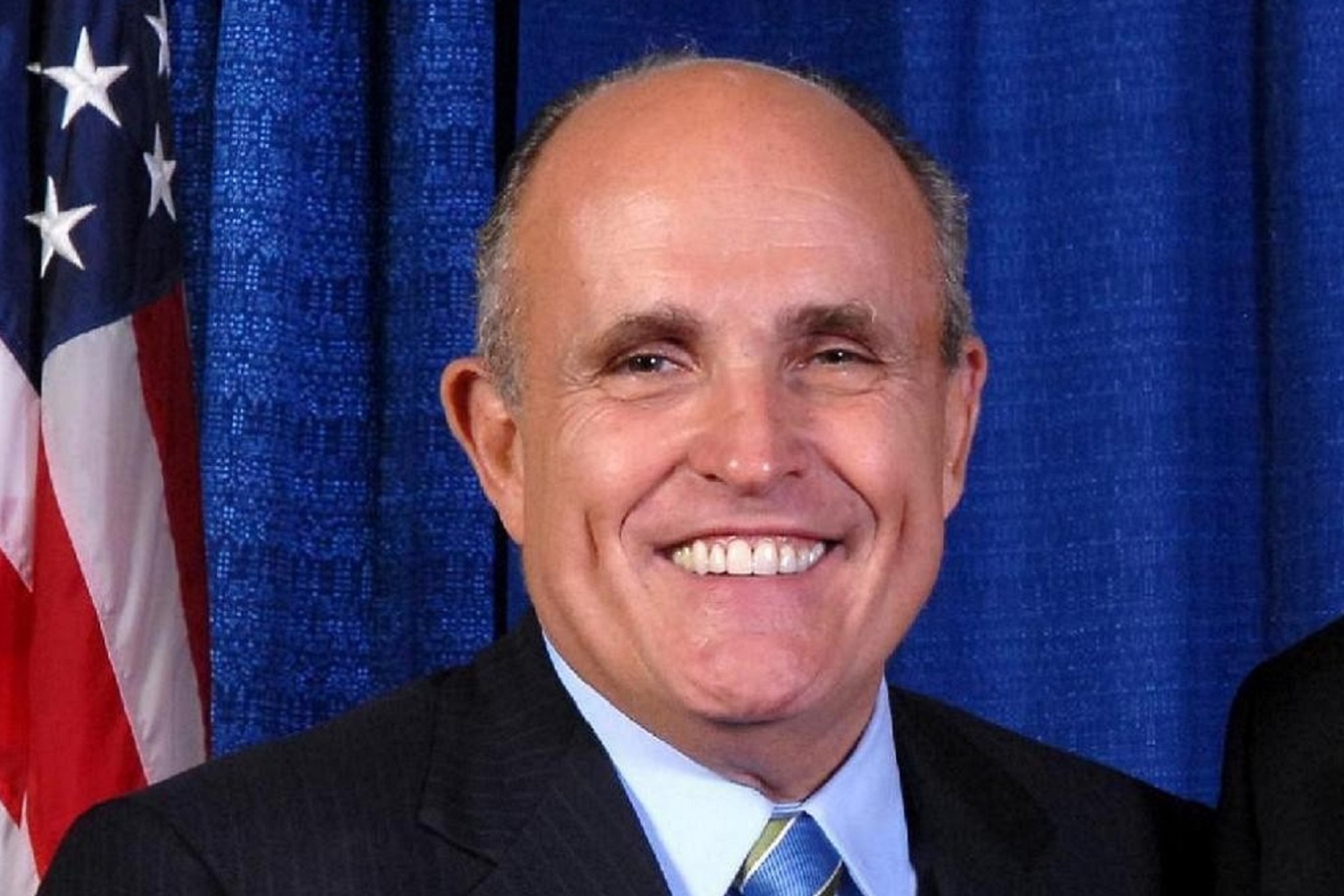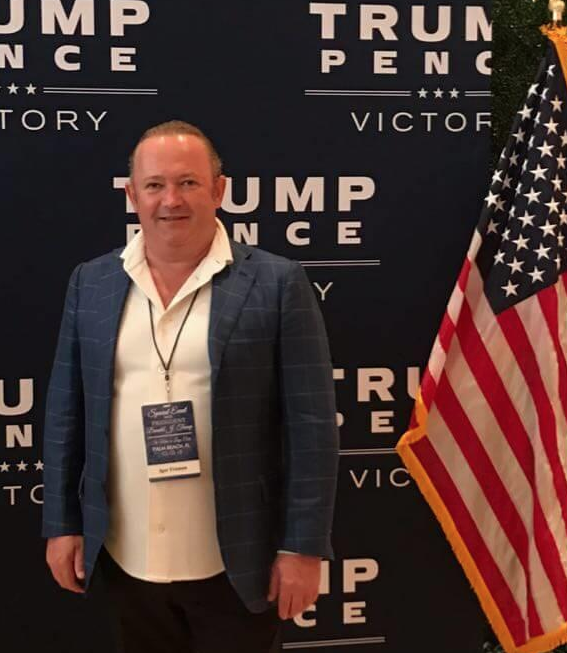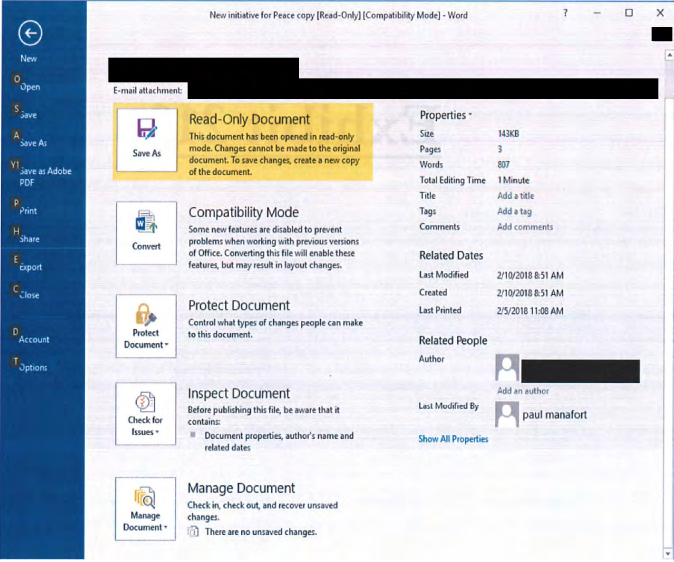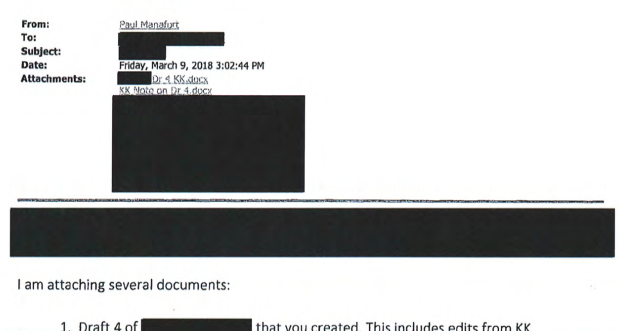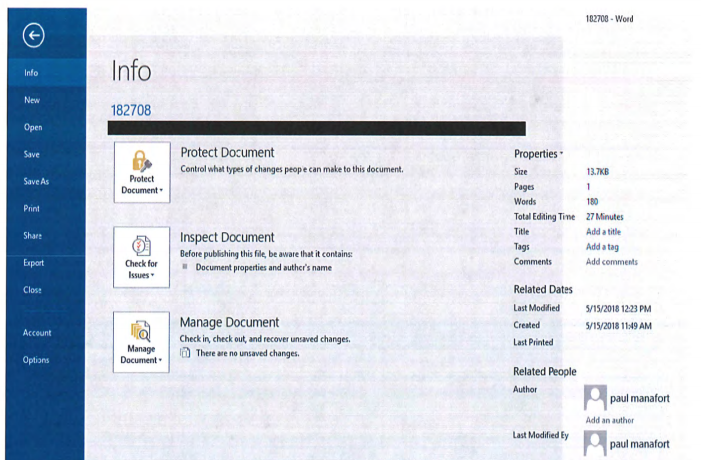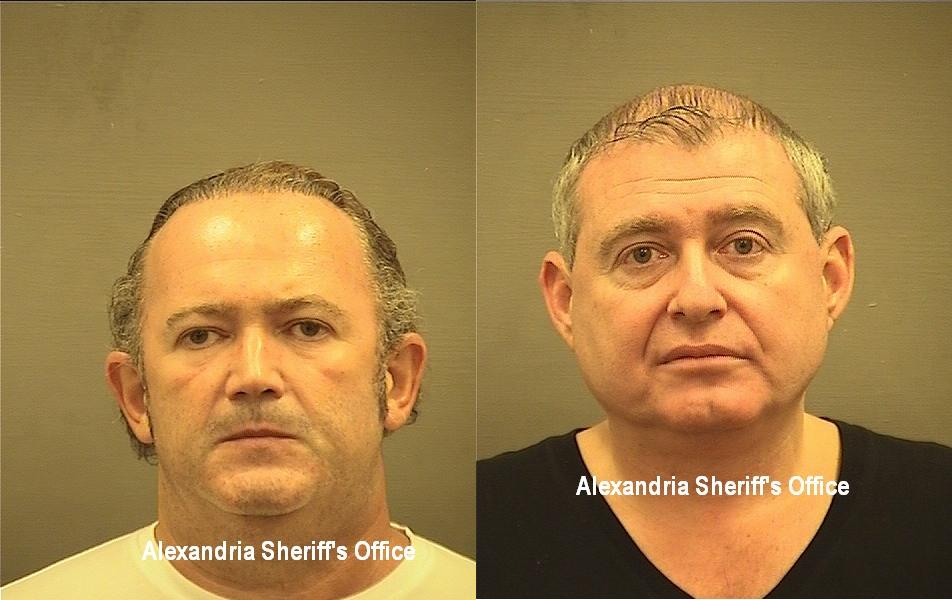Gordon Sondland is behind closed doors right now, trying to talk his way out of implication in crimes (he is represented, it should be noted, by the same lawyer who helped Karl Rove talk his way out of crimes in Valerie Plame’s outing, Robert Luskin).
But if Congressional staffers are doing their job, he’s going to have a hard job to spin what he did as anything but criminal. That’s true, in part, because his statement is full of obvious contradictions and evasions. But contrary to what many in the press (fed in advance with deceptive claims about his testimony) have claimed, the statement does not break with Trump, it protects him.
Who’s the boss?
Sondland’s first inconsistency pertains to one of the most important issues: why he was in charge of Ukrainian policy when Ukraine isn’t even in the EU. His general explanation for it is bullshit — and also should raise questions about what he has been doing in Georgia, Venezuela, and Iran. He studiously avoids explaining who ordered him to focus on Ukraine (as other testimony has made clear, the answer is because Trump ordered him to).
From my very first days as Ambassador, Ukraine has been a part of my broader work pursuing U.S. national interests. Ukraine’s political and economic development are critical to the long-lasting stability of Europe. Moreover, the conflict in Eastern Ukraine and Crimea, which began nearly five years ago, continues as one of the most significant security crises for Europe and the United States. As the U.S. Ambassador to the EU, I have always viewed my Ukraine work as central to advancing U.S.-EU foreign policy. Indeed, for decades, under both Republican and Democrat Administrations, the United States has viewed Ukraine with strategic importance, in part to counter Russian aggression in Europe and to support Ukraine energy independence. My involvement in issues concerning Ukraine, while a small part of my overall portfolio, was nevertheless central to my ambassadorial responsibilities. In this sense, Ukraine is similar to other non-EU countries, such as Venezuela, Iran, and Georgia, with respect to which my Mission and I coordinate closely with our EU partners to promote policies that reflect our common values and interests. I always endeavoured [sic] to keep my State Department and National Security Council colleagues informed of my actions and to seek their input.
But the logistics of it are more interesting, particularly as it pertains to coordinating with Rudy Giuliani.
At times (at both the very beginning, after his description of the July 10 meeting, and again to explain away the July 10 meeting), he emphasizes that Mike Pompeo has approved of all this.
I understand that all my actions involving Ukraine had the blessing of Secretary Pompeo as my work was consistent with long-standing U.S. foreign policy objectives. Indeed, very recently, Secretary Pompeo sent me a congratulatory note that I was doing great work, and he encouraged me to keep banging away.
[snip]
We had regular communications with the NSC about Ukraine, both before and after the July meeting; and neither Ambassador Bolton, Dr. Hill, nor anyone else on the NSC staff ever expressed any concerns to me about our efforts, any complaints about coordination between State and the NSC, or, most importantly, any concerns that we were acting improperly.
Furthermore, my boss Secretary Pompeo was very supportive of our Ukraine strategy.
[snip]
While I have not seen Dr. Hill’s testimony, I am surprised and disappointed by the media reports of her critical comments. To put it clearly: Neither she nor Ambassador Bolton shared any critical comments with me, even after our July 10, 2019 White House meeting. And so, I have to view her testimony — if the media reports are accurate — as the product of hindsight and in the context of the widely known tensions between the NSC, on the one hand, and the State Department, on the other hand, which had ultimate responsibility for executing U.S. policy overseas. Again, I took my direction from Secretary Pompeo and have had his consistent support in dealing with our nation’s most sensitive secrets to this very day.
Again, the public record makes it clear he was put in this role by Trump, not Pompeo. And while I’m sure Pompeo knew of what he was doing (his suggestion that Pompeo was “supportive of it” seems most clearly on point), he was reporting directly, via a third channel of authority, directly to Trump.
That said, his suggestion that Pompeo — a former CIA Director but now in charge of diplomacy, which is not supposed to be the realm of utmost secrecy — trusts him “with our nation’s most sensitive secrets,” suggests there’s something else going on here, something about which he’s reassuring Pompeo he’ll remain silent.
The claim that he took his direction from Pompeo, bolded above, is contradicted on the matter of Rudy Giuliani’s involvement. His description of why Rudy was involved varies slightly over time. Initially, he says he coordinated with Rudy because the Three Amigos, collectively, decided they had to involve Rudy to achieve other diplomatic objectives.
Secretary Perry, Ambassador Volker, and I were disappointed by our May 23, 2019 White House debriefing. We strongly believed that a call and White House meeting between Presidents Trump and Zelensky was important and that these should be scheduled promptly and without any pre-conditions. We were also disappointed by the President’s direction that we involve Mr. Giuliani. Our view was that the men and women of the State Department, not the President’s personal lawyer, should take responsibility for all aspects of U.S. foreign policy towards Ukraine. However, based on the President’s direction, we were faced with a choice: We could abandon the goal of a White House meeting for President Zelensky, which we all believed was crucial to strengthening U.S.-Ukrainian ties and furthering long-held U.S. foreign policy goals in the region; or we could do as President Trump directed and talk to Mr. Giuliani to address the President’s concerns.
We chose the latter path, which seemed to all of us – Secretary Perry, Ambassador Volker, and myself – to be the better alternative.
Later, he claims that “his understanding” is that Trump ordered Rudy’s involvement, as if he didn’t get that order directly.
Mr. Giuliani does not work for me or my Mission and I do not know what official or unofficial role, if any, he has with the State Department. To my knowledge, he is one of the President’s personal lawyers. However, my understanding was that the President directed Mr. Giuliani’s participation, that Mr. Giuliani was expressing the concerns of the President, and that Mr. Giuliani had already spoken with Secretary Perry and Ambassador Volker.
Still later, he strengthens that, suggesting he was “taking direction from the President” directly.
As I stated earlier, I understood from President Trump, at the May 23, 2019 White House debriefing, that he wanted the Inaugural Delegation to talk with Mr. Giuliani concerning our efforts to arrange a White House meeting for President Zelensky. Taking direction from the President, as I must, I spoke with Mr. Giuliani for that limited purpose.
If he was taking orders from Trump on involving Rudy (which is almost certainly the case), then the claims of Pompeo’s role are just cover.
Sondland is obfuscating on both these issues: why the EU Ambassador was put in charge of Ukraine policy, and why Rudy was allowed to dictate Ukraine policy. While the press thinks Sondland has taken a big break from Trump, he has not on the key issue: that Sondland was taking orders from Trump and doing precisely what the President ordered him to.
The royal we
There are really telling passages in this statement where Sondland slips into the first person plural. Generally, he does so when describing something that he, Rick Perry, and Kurt Volker jointly believe. As noted, he does so is to explain why he and Rick Perry and Kurt Volker coordinated with Rudy.
It was apparent to all of us that the key to changing the President’s mind on Ukraine was Mr. Giuliani. It is my understanding that Energy Secretary Perry and Special Envoy Volker took the lead on reaching out to Mr. Giuliani, as the President had directed.
Indeed, Secretary Perry, Ambassador Volker, and I were disappointed by our May 23, 2019 White House debriefing. We strongly believed that a call and White House meeting between Presidents Trump and Zelensky was important and that these should be scheduled promptly and without any pre-conditions. We were also disappointed by the President’s direction that we involve Mr. Giuliani. Our view was that the men and women of the State Department, not the President’s personal lawyer, should take responsibility for all aspects of U.S. foreign policy towards Ukraine. However, based on the President’s direction, we were faced with a choice: We could abandon the goal of a White House meeting for President Zelensky, which we all believed was crucial to strengthening U.S.-Ukrainian ties and furthering long-held U.S. foreign policy goals in the region; or we could do as President Trump directed and talk to Mr. Giuliani to address the President’s concerns.
We chose the latter path, which seemed to all of us – Secretary Perry, Ambassador Volker, and myself – to be the better alternative.
Another place he does so is to explain why the Three Amigos moved forward on scheduling the July 25 call when John Bolton and Fiona Hill were opposed (he’s utterly silent about the second half of his July 10 meeting with the Ukrainians).
We three favored promptly scheduling a call and meeting between Presidents Trump and Zelensky; the NSC did not.
He also uses it to describe his meeting with Zelensky on July 26, after Zelensky had delivered on the quid pro quo, where he set up the White House meeting.
During this July 26, 2019 meeting in Kiev, we were able to promote further engagement, including discussions about a future Zelensky visit to the White House.
This is Gordon Sondland’s testimony, remember, not the Three Amigos’ testimony. But in these key passages, he claims — without explaining how he can do so — to speak for all three. He doesn’t explain if they had conversations (or WhatsApp threads) agreeing on all these issues, he just suggests he can speak for all three.
And his denials that he shared this statement with State or White House would not extend to these other people he invokes as “we.”
Perhaps a more interesting invocation of the third person plural comes where he claims that Bill Taylor, along with him and Volker, had no concerns about the push to get to Ukraine to publicly commit to an investigation that would deliver part of a quid pro quo.
First, I knew that a public embrace of anti-corruption reforms by Ukraine was one of the pre-conditions for securing a White House meeting with President Zelensky. My view was, and has always been, that such Western reforms are consistent with U.S. support for rule of law in Ukraine going back decades, under both Republican and Democrat administrations. Nothing about that request raised any red flags for me, Ambassador Volker, or Ambassador Taylor.
Taylor is still with State, so if Sondland is being honest when he says he hasn’t shared his statement, then Taylor has not bought off on this claim. I look forward to seeing whether he backs it when he testifies.
[Update, 11/20: I now believe that some of this use of royal “we” is meant to invoke Trump but not necessarily the other Amigos.]
Schrodinger’s quid pro quo
The press has been most excited about the fact that Sondland claims Trump may have had a quid pro quo, but he was ignorant of it.
But in fact, Sondland does not deny a quid pro quo. In fact, his carefully written statement admitting he knew the quid pro quo involved Burisma (which he claims he had no idea meant Biden) admits that the 2016 ask was part of it.
Mr. Giuliani emphasized that the President wanted a public statement from President Zelensky committing Ukraine to look into anticorruption issues. Mr. Giuliani specifically mentioned the 2016 election (including the DNC server) and Burisma as two anticorruption investigatory topics of importance for the President.
And his denials about knowing that the quid pro quo involved the 2020 elections are laughable. His first such denial claims he only learned later about the specific nature of (part of) Rudy’s quid pro quo, but he doesn’t describe when he learned of it, either there or later.
I did not understand, until much later, that Mr. Giuliani’s agenda might have also included an effort to prompt the Ukrainians to investigate Vice President Biden or his son or to involve Ukrainians, directly or indirectly, in the President’s 2020 reelection campaign.
Later, he denies recalling having any conversations about these aspects of the quid pro quo with 1) Rudy, 2) State, and 3) any “White House official” (does that description include the President?).
Third, given many inaccurate press reports, let me be clear about the following: I do not recall that Mr. Giuliani discussed Former Vice President Biden or his son Hunter Biden with me. Like many of you, I read the transcript of the Trump-Zelensky call for the first time when it was released publicly by the White House on September 25, 2019.
[snip]
Again, I recall no discussions with any State Department or White House official about Former Vice President Biden or his son, nor do I recall taking part in any effort to encourage an investigation into the Bidens.
But he doesn’t deny talking about the nature of the quid pro quo with Volker (who’s not technically a State Department employee), Rick Perry (ditto), or the Ukrainian officials that Fiona Hill saw him discussing Burisma with on July 10.
When he denies Trump’s extortion of Ukraine, he denies only that the quid pro quo involved the 2020 election (and not Naftogaz considerations or claims about what happened in 2016 or, perhaps even more tellingly, Russian help in 2020).
Sixth, to the best of my recollection, I do not recall any discussions with the White House on withholding U.S. security assistance from Ukraine in return for assistance with the President’s 2020 re-election campaign.
In denying Bill Taylor’s concern about a quid pro quo, he dismisses it as a concern about the appearance of a quid pro quo, rather than the actuality of one.
On September 9, 2019, Acting Charge de Affairs/Ambassador William Taylor raised concerns about the possibility that Ukrainians could perceive a linkage between U.S. security assistance and the President’s 2020 reelection campaign.
Taking the issue seriously, and given the many versions of speculation that had been circulating about the security aid, I called President Trump directly. I asked the President: “What do you want from Ukraine?” The President responded, “Nothing. There is no quid pro quo.” The President repeated: “no quid pro quo” multiple times. This was a very short call. And I recall the President was in a bad mood.
Sondland here credits Trump’s statements, as if any Trump statement ever had any veracity, as true, even though they came at a time when the White House already knew about the whistleblower complaint, which makes what would already be unreliable outright laughable, if indeed Trump actually said that at all.
But the bigger point is this: Sondland doesn’t deny a quid pro quo. Just that he knew it was the quid pro quo that the House is currently most closely focused on early on in the process.
Gaps in the timeline
Given the way he is protecting Trump in all this, there are notable key gaps in his timeline.
Sondland doesn’t answer two obvious questions: why the Ambassador to the EU was part of the delegation to Volodymyr Zelensky’s inauguration, and why the inauguration delegation flew back to DC, almost immediately, to brief the President on it.
On May 20, 2019, given the significance of this election, I attended the inauguration of President Zelensky as part of the U.S. delegation led by U.S. Energy Secretary Rick Perry, along with Senator Ron Johnson, Special Envoy Volker, and Alex Vindman from the NSC. During this visit, we developed positive views of the new Ukraine President and his desire to promote a stronger relationship between Kiev and Washington, to make reforms necessary to attract Western economic investment, and to address Ukraine’s well-known and longstanding corruption issues.
On May 23, 2019, three days after the Zelensky inauguration, we in the U.S. delegation debriefed President Trump and key aides at the White House. We emphasized the strategic importance of Ukraine and the strengthening relationship with President Zelensky, a reformer who received a strong mandate from the Ukrainian people to fight corruption and pursue greater economic prosperity. We asked the White House to arrange a working phone call from President Trump and a working Oval Office visit. However, President Trump was skeptical that Ukraine was serious about reforms and anti-corruption, and he directed those of us present at the meeting to talk to Mr. Giuliani, his personal attorney, about his concerns.
One reason those players would have flown to DC to debrief Trump is because of the scheme to take over Naftogaz led by Perry, something Sondland doesn’t mention at all.
He also plays games with his antecedent in trying to claim that a June 4 meeting involving Zelensky, Rick Perry, and Ulrich Brechbuhl (where they discussed natural gas, among other things) had been long planned.
Following my return to Brussels and continuing my focus on stronger U.S.-EU ties, my Mission hosted a U.S. Independence Day event on June 4, 2019. Despite press reports, this event was planned months in advance and involved approximately 700 guests from government, the diplomatic corps, the media, business, and civil society. The night featured remarks by the Ambassador and High Representative of the European Union for Foreign Affairs. Following the main event, we hosted a smaller, separate dinner for about 30 people. President Zelensky and several other leaders of EU and non-EU member states attended the dinner, along with Secretary Perry, U.S. State Department Counselor Ulrich Brechbuhl on behalf of Secretary Pompeo, and numerous other key U.S. and EU officials. Though planned long in advance with the focus on improving transatlantic relations, we also viewed this event as an opportunity to present President Zelensky to various EU and U.S. officials and to build upon the enhanced government ties.
He uses “this event” to refer both to the larger 700 person event and the smaller 30 person meeting, effectively making a claim — that the larger event had been long-planned — that he tries to apply to the smaller one. He also is curiously silent about Jared Kushner’s involvement.
In addition to being silent about the second part of his July 10 meeting — the part that got John Bolton worried about what drug deals he was doing — Sondland is also silent about his pre-call briefing to Trump on July 25, after Bolton’s prep.
I was not on that July 25, 2019 call and I did not see a transcript of that call until September 25, 2019, when the White House publicly released it. None of the brief and general call summaries I received contained any mention of Burisma or former Vice President Biden, nor even suggested that President Trump had made any kind of request of President Zelensky.
And his denials about the post-call summaries mentioning Burisma or Biden do not amount to a denial that his prep did. Nor does that denial address his July 26 conversation with Trump (which he addresses in a different section), which he describes as nonsubstantive without addressing whether Trump mentioned the quid pro quo.
I do recall a brief discussion with President Trump before my visit to Kiev. That call was very short, nonsubstantive, and did not encompass any of the substance of the July 25, 2019 White House call with President Zelensky.
In other words, even where denies talking about the quid pro quo, the denials don’t amount to denials in the most important conversations.
Sondland’s silence about WhatsApp
Finally, Sondland is playing games regarding what communications he has had. With the exception of his July 26 and September 9 calls, doesn’t describe what direct communications with Trump he has had.
Just as key, he is mostly silent about his conduct of diplomacy on WhatsApp, precisely the crime (doing official business on private accounts) Trump accused Hillary of to get elected (though his lawyers wrote a letter claiming that they’re helpless in the face of State’s refusal to share his comms). That’s all the more telling given the structure of Sondland’s denials of extensive comms with Rudy. His statement deals with three different kind of comms. He focuses on in-person meetings and phone calls.
To the best of my recollection, I met Mr. Giuliani in person only once at a reception when I briefly shook his hand in 2016. This was before I became Ambassador to the EU. In contrast, during my time as Ambassador, I do not recall having ever met with Mr. Giuliani in person, and I only spoke with him a few times.
[snip]
My best recollection is that I spoke with Mr. Giuliani for the first time in early August 2019, after the congratulatory phone call from President Trump on July 25, 2019 and after the bilateral meeting with President Zelensky on July 26, 2019 in Kiev. My recollection is that Mr. Giuliani and I actually spoke no more than two or three times by phone, for about a few minutes each time.
[snip]
As I stated earlier, I understood from President Trump, at the May 23, 2019 White House debriefing, that he wanted the Inaugural Delegation to talk with Mr. Giuliani concerning our efforts to arrange a White House meeting for President Zelensky. Taking direction from the President, as I must, I spoke with Mr. Giuliani for that limited purpose. In these short conversations, Mr. Giuliani emphasized that the President wanted a public statement from President Zelensky committing Ukraine to look into anticorruption issues.
[snip]
Ten weeks after the President on May 23, 2019 directed the Inaugural Delegation to talk with Mr. Giuliani, I had my first phone conversation with him in early August 2019. I listened to Mr. Giuliani’s concerns
But he acknowledges that Volker introduced him to Rudy “electronically.”
Ambassador Volker introduced me to Mr. Giuliani electronically.
Nowhere in his statement does he explain what form of electronic communication this introduction took place over, and nowhere does he deny having WhatsApp (or any other kind of texting) communications with Rudy.
That’s all the more curious given that he claims — ridiculously — that his statements to Bill Taylor to avoid talking about a quid pro quo on WhatsApp were not an attempt to avoid leaving a record.
Fifth, certain media outlets have misinterpreted my text messages where I say “stop texting” or “call me.” Any implication that I was trying to avoid making a record of our conversation is completely false. In my view, diplomacy is best handled through back-and-forth conversation. The complexity of international relations cannot be adequately expressed in cryptic text messages. I simply prefer to talk rather than to text. I do this all the time with family, friends, and former business associates. That is how I most effectively get things done. My text message comments were an invitation to talk more, not to conceal the substance of our communications.
Immediately after saying those WhatsApp texts no not really record the truth, he points to some emails that, he says, show that he truthfully did not want a quid pro quo.
I recall that, in late July 2019, Ambassadors Volker and Taylor and I exchanged emails in which we all agreed that President Zelensky should have no involvement in 2020 U.S. Presidential election politics.
Remember: State is withholding all of Sondland’s electronic comms from the impeachment inquiry (even assuming he turned them all over to State). So his games with phone calls and texts should be assumed to be just that, claims made from the temporary security of believing the comms to check his claims will never be turned over.
Which is to say that Sondland says quite a bit in this statement. But the most important things are his silences.
Update: On November 5, Sondland unforgot some stuff laid out in Bill Taylor and Tim Morrison’s testimony. But many of the holes laid out above remain.

